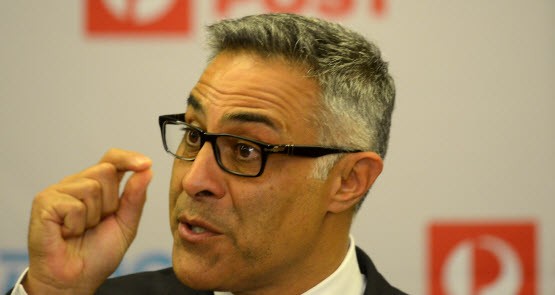
Blame Kevin Rudd. In the midst of his disastrous prime ministerial reign, Rudd appointed Ahmed Fahour to run Australia Post. Six months earlier, Fahour had been overlooked to become the CEO of NAB. Fast forward seven years, and Fahour is arguably the highest-paid public utility executive in the world, and Australia Post is trying to cover up the executive’s salary.
According to Fairfax, Australia Post is refusing a freedom of information request to reveal Fahour’s 2016 salary on the basis that “there is no public interest in the disclosure of personal information pertaining to officers of Australia Post”. One must wonder: if the salary of the highest taxpayer-funded person in the country is not in the public interest, what exactly would be in the public interest?
Since being appointed as CEO of AusPost in December 2009, Fahour has taken home upwards of $20 million — and it’s not as if he needed the money. A few years earlier he had been paid a sign-on bonus of $13 million to join NAB from Citigroup. And while Fahour’s financial outlook looks rosy, AusPost’s does not. Australia Post has had profit before tax drop from $332 million in 2011 to only $36.4 million in 2016. Return on equity, the best measure of business performance, has slumped from 13.4% to 2.3% (AusPost recorded a $222 million loss in 2015).
Fahour’s pay packet has been a long-running corporate governance problem for AusPost. As Crikey noted back in 2014:
“The US Postmaster General (who runs an organisation many times larger than AusPost) received US$384,229 in 2012 (a figure that was criticised by US law-markers for being too high). That means Fahour is paid more than 10 times what his US counterpart is paid. Moya Greene, the head of Royal Mail in the UK, was paid 1.47 million pounds [about half of what Fahour got paid].”
Fahour is not only paid almost 10 times as much as the Australian Prime Minister, but his remuneration is over-the-top high compared to very generously remunerated ASX-listed CEOs. The former CEO of Toll, Australia’s largest logistics company, Brian Kruger, was paid around the same as Fahour in 2014 (despite Toll’s profit being many multiples of AusPost, which lost more than $200 million that year). And it’s not merely Ahmed who was paid like a king — so too were his chosen direct reports. Although as Jane Cadzow noted in 2015, under Fahour, executives were “acquired extremely expensively, under-utilised and then lost”.
Remuneration is not the only area of mirth for taxpayers. Despite crashing profitability, back in 2012 Fahour lavished $2.5 million of public money on hospitality at the London Olympic Games. A tad unnecessary given AusPost has a virtual monopoly on national parcel services due to its reach.
While a Citibank executive, Fahour promoted his brother Moustafa to a senior role at the bank in 2004. Then, after Ahmed became head of NAB in Australia, Moustafa was lured across as a senior executive from Macquarie Bank (it is understood that former colleagues at Macquarie Bank weren’t overly disappointed to see him go). Then Australia Post paid some of Fahour’s lofty bonus to the Islamic Museum of Australia (itself no doubt a worthy endeavour), which happened to have been founded by none other than Moustafa Fahour. According to Cadzow, Fahour’s sister, Samira, runs the museum’s cafe. In addition to money from Australia Post, the museum also received funding of $1 million from the Saudi Arabian government and $1.5 million from the Australian government.
While Fahour is paid like a top-50 ASX CEO, he doesn’t face the same scrutiny as the big end of town. As a government-owned enterprise AusPost is not subject to annual general meetings, shareholder votes, or analysts combing over performance. Now, despite being one of the highest-paid executives in the country, AusPost is even refusing to tell taxpayers exactly how much they are paying him.
*Adam Schwab is former lawyer and the author of Pigs at the Trough: Lessons from Australia’s Decade of Corporate Greed, published by John Wylie & Sons in 2010








“Productivity” doesn’t apply to CEOs?
Rudd’s choice of Oz Post CEO, Fahour, equals his selection of Hollingworth as Governor-General.
Fahour has run Oz Post almost into the ground – parcels have saved it but there have been exposes about the appallingly low fees paid to the contracted couriers.
I continue to post letters and insist on paper bills but the poor delivery times have dissuaded many people not to bother. If Fahour was paid what he’s worth (evidently not much) the salary saved would create many hands-on positions at Oz Post which would increase productivity. It’s outrageous that his salary remains protected information.
….. Or run it into ‘selective privatisation’?
Australia Post, owned by our Australian Government and managed by Mr Ahmed Fahour is a classic example of why the Electorate continues to disconnect from the political class.
Mr Fahour and Australia Post determination to deny the Electorate’s right to seek information on the basis of ‘public interest’ reflects the public’s dismay at the loss, and costs of, services provided by Australia Post. The aroma of greed wafts wide. More so should it emit from the highest levels of Government enterprises.
Once the guessing begins re the salary package we are on the path to discovery.
For the wilder these rumours become Oz Post will have their hand forced.
Rose without trace, served without success, paid to fail it seems.